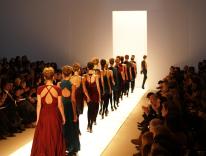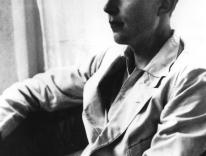Tomorrow's inauguration will be historic for many reasons, the most obvious being the installation of the nation's first African-American president. What will not change, however,is theProtestant monopolyof the event.The new president is a Protestant (though in search of a new church), and while he has the nation's first Catholic VP, the lone Catholic chief executive remains JFK--inaugurated nearly a half century ago. The Pew Forum has an excellent page of web resources.Thechart of the religious affiliation of all the presidentssays it all. Heck, the Unitarians have had four representatives in this presidential pantheon, and even the Quakers have had two. (Okay, one was Nixon. But still.) No non-Christians (Heaven forfend!) but three "unaffiliated"--Andrew Johnson, Jefferson and Lincoln--all of whom had beliefs of a sort, though atheist organizations also like to claim them as native sons.Why no Catholics, despite the Church's standing as the nation's largest single denomination? Good question, and maybe folks will have some answers. Suggestions: Catholics are so divided among themselves they have no "bloc" to get behind a candidate or party, the way evangelicals do, e.g. Or the leadership and laity are so divided that drafting a Catholic candidate is too risky. Or, perhaps,Catholicism, for allits vauntedassimilation,remains too distinctive, too "different" from the prevailing non-denominational ethos.That last factor struck me as I was reading Steve Waldman's posts at Beliefnet. Waldman has written a book about the faith (or lack thereof) of the Founding Fathers, and he has been researching the history of inaugural address and prayers (his archive of prayers is here). Waldman also discovered the odd fact that the inaugural prayersbefore 1989 (FDR began the practice in 1937) were quite diverse affairs, with Protestant clergy delivering fewer than half the invocations and benedictions. By contrast, 12 prayers will have been delivered at inaugurations since 1989 and all of themwill have been delivered by Protestants--including tomorrow's, with Pastor Rick Warren andthe Rev. Joseph Lowery giving the invocation and benediction, respectively. Everyone else--Jews, Hindus, Muslims, Greek Orthodox, and, yes, Catholics--will get a turn the next day at the National Prayer Service at the (Episcopal) National Cathedral.As Steve notes inthis piece (which also ran in the Wall Street Journal), Christian clergy in earlier decades prayed in the name of Jesus Christ without disruption, because that was the culture, but also because the dais looked like one of those "walked-into-a-bar" jokes--a minister, a priest and a rabbi. The evangelical Protestant monopoly has arguably contributed to the efforts of some atheist groups (Michael Newdow et al, most notably) to try to stop such religious expressions. But as Steve notes, the monopoly really puts the onus on Warren and Lowery to be inclusive:
"They are Christian ministers and need to stay true to their faith. But they are the only clergy on the podium and therefore must represent all Americans. If they can't restore the proper balance that existed before 2001, then their prayers will--and should--increase the drumbeat to get rid of inaugural prayers entirely."
I wouldn't want to go that far, though it's interesting to realize that the inaugural prayers, like so much about our godly"Christian" nation ("In God we trust" on the coins, "under God" in the Pledge) is such a recent "tradition." Mark Silk unpacks it in an interesting blog post explaining why FDR began the practice and his political savvy in choosingMsgr. John A. Ryan (The Right Reverend New Dealer"!) to give the benediction. Silk also says:
"Arguably, FDR instituted it precisely to give Ryan the honor. And thereby to signal that Roman Catholicism was now to be an equal partner at national ceremonious occasions. And, perhaps above all, to make it clear that FDR himself was not anti-God and the New Deal not communistic."
I am not arguing for special treatment in the least. And I don't think this represents anti-Catholicism of any overt sort. Yet it does seem that there is a growing cultural hegemony of non-denominational (evangelical/Southern Baptist/regular Baptist) Christianity that plays particularly well. And the oddball religions that don't fit into the tableau so neatly get stuck in the NPS party the day after, like the loser freshmen at the Omega house party in"Animal House." Or something like that.


